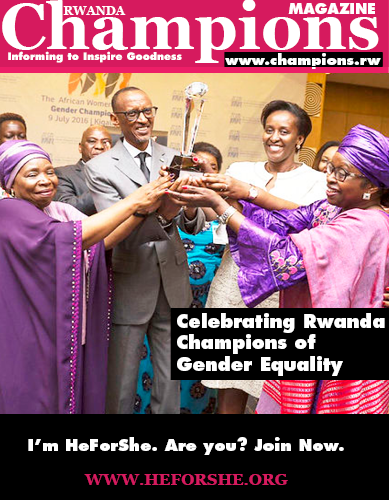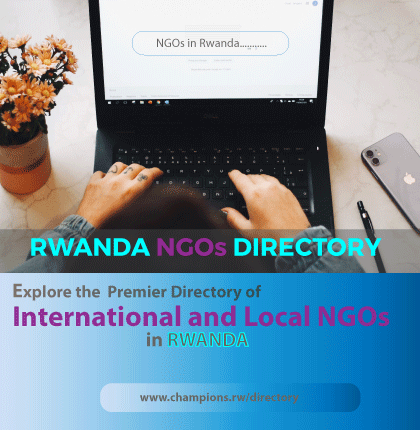UN Women Rwanda launches $6.3 million plan to boost women’s empowerment
UN Women Rwanda has launched a new four-year strategic plan that will require about $6.3 million to expand programs (…)

By Bosco Kagaba
Tripling girls’ enrolment in Technical and Vocational Education and Training (TVET) to advance women’s employment opportunities is the second out of three commitments Rwanda made under the HeForShe solidarity movement for gender equality. With this commitment, the government believes that equipping girls with the right technical vocational skills will increase their ability to increase their earnings through decent employment or their ability to create their own employment based on their acquired hands-on skills.
In the broader sense, this commitment will help to increase women’s livelihoods and reduce the economic inequality between men and women. This could drastically reduce family conflicts based on economic inequality as it also helps the government to meet its economic development projections.
Looking at how the government continues to implement the TVET policy, it is evident that integrating girls and women into the current situation will result into an accelerated pace although the number of girls joining TVET program remains smaller than the number of boys coming on board. However, based on the available government statistics, there are some academic specializations in TVET where the number of girls is almost equal the number of boys.
However, this commitment along with the first commitment of HeForShe which seeks to reduce the gender digital divide by increasing girls’ access to ICT, usage and innovation seek to ensure that girls go beyond the academic trades in which they are traditionally expected to take part and enroll into the more demanding trades that have for years been literally reserved for boys. These include TVET programs which focus on practical aspects of learning and the tough subjects such as Science, Technology, Engineering and Math (STEM).
According to the Workforce Development Authority (WDA), a public institution that ensures smooth implementation of the TVET policy, in 2016 TVET program was running at different qualification levels and Rwanda had more than 390 TVET schools across the country with at least 3 schools in each district. These schools were handling more than 94,373 students per year including women in 2016.
Through the Workforce Development Authority, Rwanda boasts of more than 98 competent based training curriculum aligned to the country’s technical qualification framework. The number of students enrolling into TVET Programs has also been on the rise since 2010, thanks to the new curriculum. For-example, in 2010, the number of students who enrolled in TVET stood at 51,773 and increased to 83,839 in 2013. And at the center of these figures, were women enrolling in various trades taught under the TVET program.
IPRC South is one of the TVET regional centers that have the responsibility to ensure smooth implementation of the TVET policy by enrolling both female and male students. In terms of supporting gender equality and encouraging girls to take on TVET training, IPRC South has supported the HeForShe awareness campaign with the aim of raising TVET awareness and increasing the number of girls and women enrolling into TVET schools.
IPRC south sensitizes girls and boys on Gender Equality and Women Empowerment which is helping both male and female students to enroll in different courses offered by IPRC South. The courses include Advanced diploma programs such as Civil engineering ( which Consists of Construction Technology, Land surveying, Quality surveying), Electrical Technology, Electronics Technology, Information and Communication Technology, Mechanical Engineering (Production and manufacturing), Veterinary Technology, Crop production( Agriculture) and Vocational Training programs offered within one year in Plumbing, Welding, Masonry, ICT, Carpentry, Hospitality and Tourism, Domestic electrical installation, Irrigation Technology and Agricultural Mechanization.
The school says that male and female students are enrolled in IT Special courses such as CISCO Networking and Oracle Training which are also critical for raising the technological skills.
Tuyishime Grace, a female student in Electronics and Telecommunication Technology level II at IPRC south says that she is able to do all electronics related activities with no difficulties due to the knowledge she is getting IPRC South. She plans to create her own employment and employ others after completing studies.
Manitegeka Pascaline, a female student at IPRC South in Electronics Level II encourages girls to join TVET education without hesitation. She further advises girls: “What matters is to love of your option and work hard to accomplish your goal of being independent without relying on others,” urges Manitegeka, adding that girls and women can do what men can do.
For him, Ndayamaje Celestin, a male student in civil engineering Level, ladies can do what men can do. “When we are at school girls also take the lead to assist boys with clarifications on lessons after classes and we also help them. What we can afford to do even girls can do it,” says Ndayambaje.
IPRC Interventions on gender equality and women empowerment
IPRC South says that has intervened in promoting gender equality and women empowerment and this continues to be a constant process although it has exciting achievements.
Its interventions include implementation of Gender and Inclusiveness Activities in IPRC South Action Plan, sensitizations on Gender and Inclusiveness in Vocational Training Centers (VTCs) and Technical Secondary Schools (TSS) while encouraging enrolment of girls in TVET Schools, provision of training workshops to the School Managers and appointment of Gender Focal Points of Technical Secondary Schools (TSS) and Vocational Training Centers (VTCs) in Southern Province and formation of Gender clubs in IPRC South community.
Although IPRC South is one of the most active TVET training institutions, it still has a low number of female students compared to male students. Its statistics show that students pursuing diplomas courses in academic year 2015-2016 were 1,215 but female students were only 212 while male students were 1,003. In the academic year 2016-2017, diploma students were 1,200 with only 250 female students while the rest were male students. In VTCs, students in academic year 2015-2016 were 204 with 6 female students and 198 male students.
Source: IPRC South
UN Women Rwanda has launched a new four-year strategic plan that will require about $6.3 million to expand programs (…)
UN Women Rwanda has launched a new four-year strategic plan that will require about $6.3 million to expand programs (…)
African women leaders are calling for greater solidarity and collaboration to help more women attain leadership (…)
Women for Women International (WfWI) has appointed Nigerian development expert Thelma Ekiyor as its new global chief (…)

